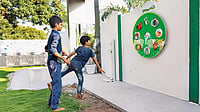Today when the practice of wearing a mask is slowly and gradually disappearing among people, 44-year-old Ramdhari Kumar, a street vendor in the old Delhi area selling balloons and toys, makes it a point to cover his nose and mouth while dealing with consumers. He says that buyers feel more confident and freer to interact with him, and there are chances of higher sales. “The pandemic caused a huge loss to us. However, it taught us lessons in good health and hygiene,” Kumar says, as he gives credit to Banega Swasth India (BSI), a campaign run by Dettol, for this behaviour change.
Kumar is among the more than 300,000 street vendors from four cities—Delhi, Hyderabad, Surat and Bangalore—who benefited from the campaign, which aims to provide training and access to hygiene products like Dettol soaps and masks to ensure better health and hygiene practices. Simultaneously, it helps vendors to emerge from their languishing financial conditions by instilling public confidence in street goods and products.
Another vendor, Avtar Singh, from a busy market in Noida, Sector 18, explains, “Today, many vendors may not be wearing masks, but a strong sense of hygiene and healthy living has developed among them. They have learnt that if they maintain personal hygiene and keep surroundings neat and clean, it is good for health and businesses. The Dettol campaign has a life-changing impact on a large number of us and our families.”
In March 2020, when the countrywide lockdown was imposed to prevent the spread of the virus, street vendors were among the worst hit, as they lost daily earnings, which were the sole means to provide food at the table. Though governments and local authorities gradually allowed vendors who sold essential commodities, such as fruits and vegetables, to come on the streets, local communities were apprehensive about buying things from them.
Customers were worried about vendors’ hygiene and, initially, many considered them to be the carriers of the virus. In several places, there was resistance against street vendors. “They work in an unprotected environment and usually are the first point of contact in the supply chain for consumers, who were obviously at high risk. Hence, during the pandemic, it became crucial to provide the vendors appropriate training and knowledge on safety and hygiene,” says Arbind Singh, national coordinator, National Association of Street Vendors of India (NASVI). He adds, “With India reopening after the first lockdown and as people were afflicted by sudden subsequent peaks of Covid, the programme gained paramount importance. Addressing the situation, the Dettol partnership effort was designed to prepare vendors to be safe and serve consumers safely and hygienically.”
When the Delhi Disaster Management Authority allowed weekly markets in August 2020 on a trial basis, NASVI organised a rath campaign to raise safety awareness among the vendors in the weekly market and distributed hygiene kits from Dettol (masks and soaps) so that they could carry on with their livelihoods without dangers. NASVI informed them of anti-Covid measures, including social distancing and mandatory use of masks.
Shalivan Ranga, a vendor in Hyderabad and a member of the executive committee of NASVI, explains, “In my city, we distributed hygiene kits among the vendors and shared preventive measures. We covered almost the major markets such as Sultan Bazaar, Begum Bazaar, Mettuguda, Anandbagh and Kukatpally Housing Board.” Similar exercises were carried out in Bengaluru’s prominent areas such as Dasarahalli zone, Gandhi Bazaar, T. Dasarahalli, NTTF Manjunath Nagar, MG Road and Chickpet Market among others. Vendors were appropriately informed about preventive measures they had to take while interacting with customers.
In Surat, NASVI distributed safety kits in markets, such as Sheetal Talkies, Bapu Nagar Main Road, Sabzi Bazar, Mahidhapura, Choksi Bazaar and Palampur Patai. Street vendors feel that the campaign turned out to be a game-changer. They say that it lets the vendors get into the habit of keeping their hands sanitised and face covered with masks, as well as make the general public feel confident about buying products from them.
“It was a noble initiative on part of Dettol to collaborate with NASVI for a programme to support street vendors and create a healthy and hygienic environment,” says Singh. Trained staff and volunteers, both from Reckitt and NASVI took to streets in four cities and worked 24x7 on a war footing to equip vendors with correct hygienic vending protocols. “The initiative provided a new lease of life to us. Most problems were due to misinformation and panic among buyers. The campaign came as a saviour for millions of street vendors and their families,” says Sabbir, a tea-seller in Surat.
The most important period included the months immediately after the first lockdown, when people were hesitant to buy products from the open-area vendors. In fact, many decided to use ecommerce even for vegetables and daily supplies. This reversed because of the Dettol campaign, among other factors. Now that the pandemic fears have reduced, the impact is more on the vendors whose thinking about hygiene has changed.
“We have learnt the importance of cleanliness at workplaces, homes and neighbourhood. Now, we frequently wash hands after every activity, and this makes us feel good and clean. I have taught my kids the same habits, and they follow them religiously. I thank Dettol for running a wonderful campaign for our welfare,” says a confident Sabbir. Similar thoughts are voiced by another vendor, Surjeet, from one of the busiest markets in East Delhi, where he sells clothes. “I feel that I am now more concerned about health and hygiene. Now, I tell others the importance of cleanliness and urge them to maintain it in their personal lives.”

























